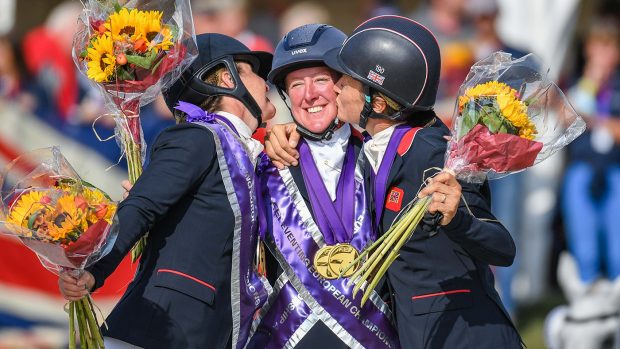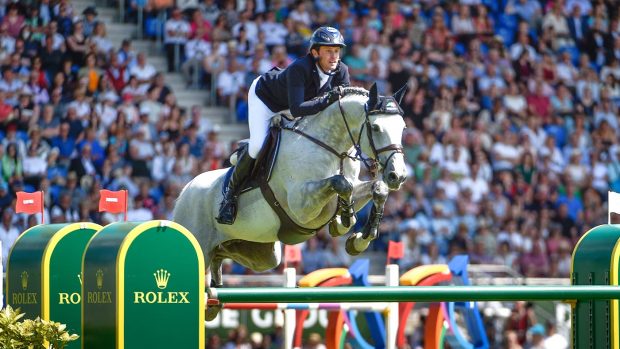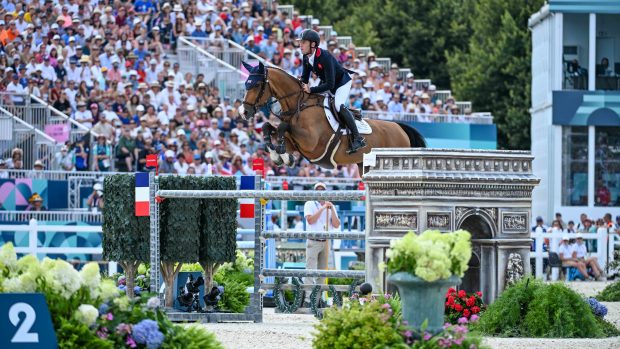The Tokyo Olympic and Paralympic legacy will be felt in Japan long after memories of this summer’s sport fade, with the tangible venue of the Equestrian Park, and the broader boost to equestrianism that has come with the Games.
The revamped Equestrian Park at Baji Koen, itself a legacy venue of both the cancelled 1940 Olympics, and the 1964 Games, will remain in place for the benefit of horse sport in Japan.
The original plan put forward by the Tokyo 2020 organising committee was for a temporary venue in the Tokyo Bay area. But the Japan Racing Authority (JRA), which owns and runs Equestrian Park, and the Japanese Equestrian Federation pushed to re-use the 1964 facility.
The complete refurbishment included building a brand-new veterinary clinic, which is there for the future, as well as upgrading the arena and other facilities.
“We began planning the redevelopment of the venue even before Tokyo won the right to host the 2020 Olympic and Paralympic Games,” said Takahiro Nishi, adviser to the JRA’s horse-affairs division.
“The Equestrian Park was not initially built to cater to the specific needs and requirements of people with disabilities. But through our preparations for the Paralympic Games, we have gained a better understanding of what we need to do to create a safe and welcoming structure which allows people with different impairments to fully enjoy all that equestrian sport has to offer.
“All our development plans have been created to include accessibility requirements for people with disabilities, so the Equestrian Park, which also functions as a city park, can bring clear benefits to our community even after the Paralympic Games have ended.”
The high-tech footing installed for the Games, which is made up of sand with 1.5% polyester textile fibres, is expected to last for 20 years with the right maintenance, while the JRA-funded state-of-the-art veterinary clinic is another lasting legacy.
“In 2016 the JRA demolished the former veterinary clinic here at Baji Koen and built these fabulous facilities so that we can provide optimal care for the Olympic and Paralympic horses during the Games. And it has a double benefit as a great investment for the future”, said Hiroko Aida, JRA vet and Tokyo 2020 veterinary service manager.
Recognition
The growth of Japan’s strength in the Olympic equestrian disciplines was well documented ahead of and during the Games. The JRA and riders are now hopeful the Paralympic legacy will boost disability equestrian sport in the country.
The JRA has plans to create pathways to enable riders involved in therapeutic programmes to move gradually into para dressage competition. It is also planning to invest in increasing the currently small number of therapeutic riding clubs in the country.
Paralympic dressage rider Sho Inaba, 26, spoke of his hopes that the Games as a whole will increase visibility for disability sport in Japan.
“The Paralympics, as a whole, not only equestrian, allows for people to see that no matter what disability anyone has, if they try their best, they can do almost anything,” he said.
His squad-mate Mitsuhide Miyaji added: “Until now, there has been little recognition of para sports in this country. But the Paralympics have been a good opportunity for many people to learn about para equestrianism and for them to see how people with various disabilities can get involved in the sport.”
Mr Miyaji added that there was no coverage of para equestrian from the Rio 2016 Games, where he also competed, in Japan but there was a great deal in the run-up to Tokyo.
“This has allowed people to see for themselves what the sport has to offer. Also by having so many people in Japan involved in the organisation of the Paralympic Games, it has helped change the perception of para equestrian sport in the country,” he said.
Tokyo legacy: ‘Hope, solidarity and peace’
To host this Games during a pandemic was a risk and an almighty challenge. The price of postponing by a year is estimated at $2.8bn (£2.02bn), taking the final bill to $15.4bn (£11.13) – although some believe the figure to be larger. Market researchers Ipsos MORI studied global attitudes towards the rescheduled Games in the weeks ahead of the opening ceremony, finding 78% of those surveyed in Japan did not think the event should go ahead.
Add to that the fact that Japan declared a state of emergency covering the Tokyo area on 8 July, as a result of rising Covid cases, which meant additional restrictions throughout the Games, no spectators and very few overseas volunteers.
Despite all this, Tokyo pulled off a Games of “hope, solidarity and peace”, as summed up by International Olympic Committee president Thomas Bach.
Crucially, it also delivered a Games where the cumulative positive Covid test rate was extremely low – 0.03% as of 8 September, or in real terms, 312 positive samples from 1,017,190 screening tests.
“For the first time since the pandemic began, the entire world came together. Sport returned to centre stage,” said Mr Bach. “Billions of people around the globe were united by emotion, sharing moments of joy and inspiration. This gives us hope. This gives us faith in the future.”
- What was your highlight of the Tokyo Games? Send your thoughts to hhletters@futurenet.com, including your name, nearest town and country, and you could win a bottle of Champagne Taittinger
You might also be interested in:

Subscribe to Horse & Hound magazine today – and enjoy unlimited website access all year round

The Tokyo Olympic equestrian arena surface: learn more about the fascinating science of the 2020 Games footing

Daily weigh-ins and blood tests, 50 vets and a state-of-the-art facility: inside the Tokyo Olympics vet clinic

Britain’s Toyko success is a ‘gift to grab with both hands’
Horse & Hound magazine, out every Thursday, is packed with all the latest news and reports, as well as interviews, specials, nostalgia, vet and training advice. Find how you can enjoy the magazine delivered to your door every week, plus options to upgrade your subscription to access our online service that brings you breaking news and reports as well as other benefits.




